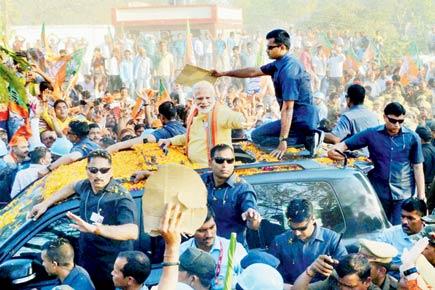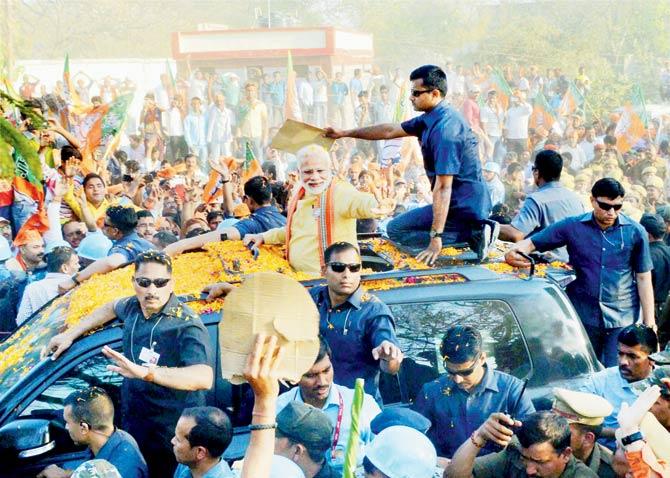They say that things like elections or cricket don’t matter in the face of death but, in fact, it is the drama of life that makes it worth living

 The crowd cheers for Prime Minister Narendra Modi during his road show in Varanasi yesterday. Pic/PTI
The crowd cheers for Prime Minister Narendra Modi during his road show in Varanasi yesterday. Pic/PTI
 Richard B is my close friend. We graduated from Stuyvesant High School in 1981; we lived in Queens, New York, he in Forest Hills and I in Flushing. As teenagers, we read Dostoevsky together, and the first porno I watched was on a projector in his basement. We together discovered India on an IndRail pass in the summer of 1982 (along with another friend who has since become a ruthless venture capitalist). Richard even visited Muzaffarpur, Bihar. We went to separate universities and lost touch after I left the US in 1986. The Internet reunited us in the late 1990s, and we've met occasionally since then. He physically changed — tall and lanky in high school, he put on a lot of weight in his 30s and, by his 40s, was a hulking giant, though his gentle nature was eternally endearing.
Richard B is my close friend. We graduated from Stuyvesant High School in 1981; we lived in Queens, New York, he in Forest Hills and I in Flushing. As teenagers, we read Dostoevsky together, and the first porno I watched was on a projector in his basement. We together discovered India on an IndRail pass in the summer of 1982 (along with another friend who has since become a ruthless venture capitalist). Richard even visited Muzaffarpur, Bihar. We went to separate universities and lost touch after I left the US in 1986. The Internet reunited us in the late 1990s, and we've met occasionally since then. He physically changed — tall and lanky in high school, he put on a lot of weight in his 30s and, by his 40s, was a hulking giant, though his gentle nature was eternally endearing.
ADVERTISEMENT
He emailed on Saturday to say that two months ago, oncologists determined that his prostrate cancer therapy was failing. He had first informed me of his cancer in 2014: he had been battling it for “a couple of years” when it metastasized and cast a shadow over him. Richard was on a clinical drug that kept him alive and he was optimistic that by 2020 cancer would be a manageable disease like diabetes, ie, chronic and treatable. He invited me to the US to celebrate his 50th birthday that year, but unfortunately I could not go.
Richard has published a few books in the US in which he reimagined the infamous 19th-century teenaged murderer Lizzie Borden, accused of axeing her parents to death, as an Agatha Christie-type, brainy crime solver. I bought his collection of short mysteries, Lizzie Borden: Girl Detective, as well as his 2015 novel, The Minuscule Monk, in which a talking dog is key to solving the crime. Reading these stories set in Victorian New England, I could lucidly hear my friend's voice and wit, unchanged from our teenaged years. It's a truism that when you read a book, you're actually reading the writer.
In his email, Richard said as his cancer therapy was failing, he was offered an immunotherapy trial using the clinical drug Keytruda, which gained famed as “the President's drug” when administered to former US President Jimmy Carter last year. Carter's cancer had spread to his liver and brain, and he had been given five weeks to live; a few months of Keytruda, however, and he was declared 'cancer-free'. Richard naturally jumped at the offer.
The first few days he was expectedly ill with chills and the flu. But on the fourth day, his platelet count plunged, leading to heavy internal bleeding in his bladder. He says it was painful. Doctors are now trying to bring his platelet count up and determine if Keytruda was the culprit. Today he starts a radiographic treatment to reduce the swelling and bring the platelet count back up. By the week's end, his future should be clearer.
This is déjà vu, for me. In 2010, my University roommate Jean-Etienne Duboscq died of brain cancer. He was a particle physicist at CERN in Geneva, in the 1990s. I cried and cried when I heard of his passing. I wish I had visited him before he died: we last met in 2002 when I drove up with my family to Cornell University, where he taught and did research. He was divorced and lived with his young daughter; in later years, he grew close to the widow of a friend (also a particle physicist, who earlier died of brain cancer). When Jean was diagnosed he was treated at Sloane-Kettering in New York, but the cancer was just too deeply lodged in his brain. Perhaps there is a link between experimental physics and brain cancer, but no physicist is likely to ever suggest this.
I pray that Richard's current cancer treatment works and he reaches remission, and that we are able to meet again, soon. Journalist colleagues, friends made during reporting assignments, and various relatives have passed away; but it is when friends from your youth stare death in the face that the full force of mortality hits you.
It's a cliché that mortality puts life's mundane events into perspective, and that it matters little if BJP wins UP or if Australia whups India's ass in Bangalore or if hate crimes in the US are actually a subset of terrorism. However, when I think of the loved ones who are no more, I feel as if they missed the drama of the world, for these mundane events do matter. These are the very things that fill up our life and make it worth living, that make us want to go on till the end. I hope Richard pulls through, if only to exchange jokes about the tamasha we call life.
Aditya Sinha's crime novel, The CEO Who Lost His Head, is available now. He tweets @autumnshade. Send your feedback to mailbag@mid-day.com
 Subscribe today by clicking the link and stay updated with the latest news!" Click here!
Subscribe today by clicking the link and stay updated with the latest news!" Click here!







